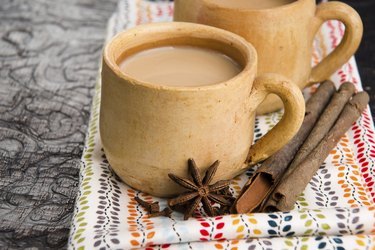
Whether you enjoy a cup of chai tea that's heavy on the spices or prefer a more mellow blend, you can be sure it contains black tea — and black tea contains caffeine. You can buy decaffeinated chai tea bags, but if it's made with natural black tea leaves you can't escape chai tea caffeine.
Tip
Yes, chai tea contains caffeine. The amount varies, but 1 cup of brewed chai tea has about 50 milligrams.
Video of the Day
Read more: The Disadvantages of Tea
Video of the Day
Understanding the Ingredients
The beverage Americans know as chai tea originated in India, where it's called masala chai, or spicy tea. Masala refers to a mix of any number of traditional Indian spices, but chai tea is usually made from five types. The dominant spicy flavor, and the base of the tea, is green cardamom.
Additionally, most chai tea blends include cinnamon, ginger, black peppercorn and fennel seed. Of course, everyone has a favorite blend, so you may also find whole cloves, star anise or coriander seeds added to the mix.
The spices are brewed together with black tea. You can use any type — Assam, Ceylon, black Darjeeling or English Breakfast. Once it's brewed, the last two ingredients in a cup of chai tea are milk and a sweetener, such as honey.
The milk may be mixed with the water and used during the brewing process, or you can add it to the tea after it's fully brewed.
Chai Tea Caffeine
Black tea naturally contains caffeine, which means your cup of chai also has it, unless you use decaffeinated tea. It's hard to nail down the precise amount of caffeine per cup.
Caffeine content depends on how much black tea was used and how long the tea was brewed before the chai tea bag was removed or the tea leaves were strained out. But even with these variables, you can estimate caffeine content.
An 8-ounce cup of black tea that's brewed for three minutes has 30 to 80 milligrams of caffeine, reports the Center for Science in the Public Interest. Chai tea falls in the same range as generic black tea, as 1 cup of a brand name chai tea latte has almost 50 milligrams of caffeine.
For comparison, the same amount of green tea has 35 to 60 milligrams, while a cup of coffee ranges from about 75 to 150 milligrams.
Watch Your Intake
Up to 400 milligrams daily is considered a moderate amount of caffeine for most healthy people, notes the U.S. National Library of Medicine. Researchers have discovered that genetics may influence each person's ability to tolerate caffeine, which is why some people are more sensitive than others.
Caffeine stimulates the central nervous system, making you more alert and boosting attention. But when you get more than your body can handle, caffeine interferes with sleep and makes you feel jittery and anxious.
Pregnant women should limit caffeine intake to 150 milligrams to 300 milligrams daily, reports the American Pregnancy Association (APA). The APA suggests avoiding caffeine as much as possible during pregnancy, however.
One study that evaluated the caffeine consumption of more than 59,000 women during their pregnancies found that caffeine was associated with a lower birth weight, reported BMC Medicine in February 2013.
None of the herbs in chai tea are listed as unsafe for use during pregnancy by the APA. The fresh ginger may even help relieve nausea and vomiting caused by morning sickness. Still, it's best to talk to your doctor before consuming herbs or caffeine when you're pregnant or nursing.
Recognize the Health Benefits
All types of teas contain flavonoids, which are natural antioxidants that protect cells in the body from damage caused by unstable molecules. The flavonoids in black tea —theaflavins and thearubigins — are different from those in green tea, but they're still associated with health benefits.
A May 2013 study published in the American Journal of Epidemiology found that men who drank 5 or more cups of black tea daily had a lower risk of developing advanced stage prostate cancer than men who had 1 cup or less each day.
Black tea may support weight loss, but the evidence so far has only come from laboratory studies using animal subjects. For example, lab mice burned significantly more calories after getting a dose of theaflavins from black tea, noted a study published by PLOS One in September 2015.
While this type of study shows promise, wait until research using people — and actual brewed tea instead of isolated flavonoids —produces similar results before counting on your chai tea to help you drop pounds.
- Center for Science in the Public Interest: "Caffeine Content of Food and Drugs"
- U.S. National Library of Medicine: "Caffeine in the Diet"
- American Pregnancy Association: "Caffeine Intake During Pregnancy"
- BMC Medicine: "Maternal Caffeine Intake During Pregnancy is Associated With Birth Weight but Not With Gestational Length: Results From a Large Prospective Observational Cohort Study"
- American Journal of Epidemiology: "Dietary Flavonoid Intake, Black Tea Consumption, and Risk of Overall and Advanced Stage Prostate Cancer"
- PLOS One: "A Single Oral Administration of Theaflavins Increases Energy Expenditure and the Expression of Metabolic Genes"
- American Pregnancy Association: Herbs and Pregnancy
- American Pregnancy Association: "Herbs and Pregnancy"